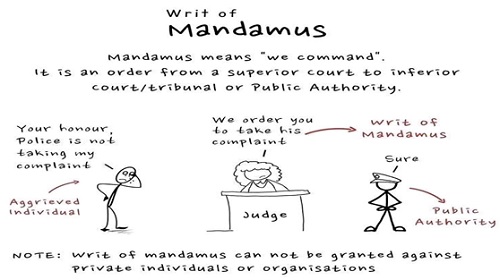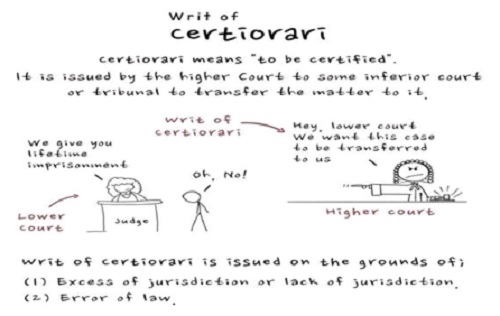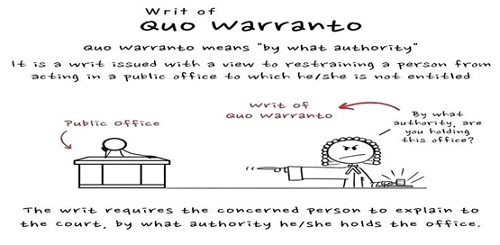Any provision in any Constitution for Fundamental Rights is meaningless unless there are adequate safeguards to ensure enforcement of such provisions. Since the reality of such rights is tested only through the judiciary, the safeguards assume even more importance. In addition, enforcement also depends upon the degree of independence of the Judiciary and the availability of relevant instruments with the executive authority. Indian Constitution, like most of Western Constitutions, lays down certain provisions to ensure the enforcement of Fundamental Rights. These are as under:
(a) The Fundamental Rights provided in the Indian Constitution are guaranteed against any executive and legislative actions. Any executive or legislative action, which infringes upon the Fundamental Rights of any person or any group of persons, can be declared as void by the Courts under Article 13 of the Constitution.
(b) In addition, the Judiciary has the power to issue the prerogative writs.
These are the extraordinary remedies provided to the citizens to get their rights enforced against any authority in the State. These writs are
– Habeas corpus, Mandamus, Prohibition, Certiorari and Quo-warranto. Both, High Courts as well as the Supreme Court may issue the writs.
(c) The Fundamental Rights provided to the citizens by the Constitution cannot be suspended by the State, except during the period of emergency, as laid down in Article 359 of the Constitution.
A Fundamental Right may also be enforced by way of normal legal procedures including a declaratory suit or by way of defense to legal proceedings. However, Article 32 is referred to of Fundamental Rights. This provision itself has been included in the Fundamental Rights and hence it cannot be denied to any person. Dr. B.R. Ambedkar described Article 32 as the most important one, without which the Constitution would be reduced to nullity. It is also referred to as the heart and soul of the Constitution. By including Article 32 in the Fundamental Rights, the Supreme Court has been made the protector and guarantor of these Rights. An application made under Article 32 of the Constitution before the Supreme Court, cannot be refused on technical grounds. In addition to the prescribed five types of writs, the Supreme Court may pass any other appropriate order. Moreover, only the questions pertaining to the Fundamental Rights can be determined in proceedings against Article 32.
Under Article 32, the Supreme Court may issue a writ against any person or government within the territory of India. Where the infringement of a Fundamental Right has been established, the Supreme Court cannot refuse relief on the ground that the aggrieved person may have remedy before some other court or under the ordinary law. The relief can also not be denied on the ground that the disputed facts have to be investigated or some evidence has to be collected. Even if an aggrieved person has not asked for a particular writ, the Supreme Court, after considering the facts and circumstances, may grant the appropriate writ and may even modify it to suit the exigencies of the case. Normally, only the aggrieved person is allowed to move the Court. But it has been held by the Supreme Court that in social or public interest matters, any one may move the Court. Any piece of legislation or law, which tends to interfere with the power of Supreme Court under Article 32 shall be declared as void. Hence, there is no way that the legislative or the executive authority can by-pass the power and responsibility entrusted to the Supreme Court by the Constitution. In a famous case titled as “Gopalan Vs State of Madras”, the Supreme Court declared Section 14 of the Preventive Detention Act of 1950 as void, because as per the Supreme Court, the said Section acted as an iron curtain around the acts of the executive authority making the order of preventive detention.
A writ is a command given by the court to a person or an authority or both to act or not in a particular way. As the writs are the commands given by the courts, they are essential parts of the judicial power of the courts.
There are five kinds of writ- Habeas Corpus, Mandamus, Prohibition, Certiorari and Quo- Warranto.
1. Habeas Corpus:
Habeas corpus is a Latin phrase that roughly translates to “you may have the body.” This writ is issued in the form of an order requiring a person who is detaining another person to bring that person before the Court and explain why he is detaining that person. If the court determines that the person has been detained unlawfully, the court will order his release. The concept under which Habeas Corpus operates is that a person who has been unlawfully imprisoned in custody without due process of law is entitled to seek habeas corpus relief.
 Landmark Case Law:
Landmark Case Law:
In the case of Rudul Sah v. State of Bihar added a new dimension to judicial activism and raised a number of important issues, including the State’s liability for unlawful detention, the feasibility of claiming compensation from the State under Article 32 for wrongful deprivation of fundamental rights, and the propriety of the Supreme Court issuing a compensation order on a habeas corpus petition for enforcing the right to personal liberty.
2. Mandamus:
The literal meaning of Mandamus is” we command.” this type of writ is used when a public official or public body or corporation or lower court or tribunal or even the government has not done the needed duty or refused to do so. After this writ is issued, the duty needs to be resumed.
A writ issued by a court to compel a lower court or a governmental person or entity to execute a specific act in order to remedy an earlier action or failure to act. It is used to compel public statutory authorities to execute their duties and act within the limitations, or to enforce different public rights. It can be utilized to bring about justice when there is an abuse of authority or a violation of the law.

Landmark Case Law:
Courts are hesitant to issue writs of mandamus against high-ranking officials such as the President and governor. Judges in the case of S.P. Gupta v. Union of India held that a writ against the President of India for determining the number of judges in the High Courts and filling vacancies could not be issued.
3. Prohibition:
The literal meaning of Prohibition is” to forbid”. This type of writ is used when a court which is in lower position i.e. the lower court exceeds its jurisdiction or unpursued a jurisdiction which is not possessed by it.

Landmark Case Law:
A writ of prohibition was issued in the case of East India Commercial Co. Ltd v. Collector of Customs, directing an inferior Tribunal not to continue with the proceeding on the grounds that it is without or in excess of jurisdiction, or in contravention of the laws of the land, statutes, or otherwise.
4. Certiorari:
The literal meaning of Certiorari is to be certified or to be informed this type of writ is used when a transfer of a case which is pending in the lower courts or the order given by lower courts in a case needs to be quashed. The writ issued on the basis of an excess of jurisdiction or lack of jurisdiction or error of law. After this writ is issued, mistakes in the judiciary are cured.

Landmark Case Laws:
The constitution bench held in T.C. Basappa v. T. Nagappa & Anr. that certiorari may and is often granted where a court acts I without jurisdiction or (ii) in excess of its jurisdiction.
5. Quo- warranto:
The literal meaning of Quo- warranto is by what authority or warrant. this type of writ is used when an illegal usurpation of a public office by a person is done. After this writ is issued, the legality of a claim of a person to office is enquired.

Landmark Case Law:
The office must be open to the public and established by statute or the constitution itself. The writ of quo warranto was denied in the case of Jamalpur Arya Samaj v. Dr D. Ram on the grounds that a writ of quo warranto cannot be issued against a private business. It is also vital for the office to have a substantial nature.
Conclusion:
Article 32 bestows upon the subjects extraordinary powers with immediate effect. Furthermore, when PILs are filed, writs are often issued against the state and are summoned against the state. The Constitution’s Writ Jurisdictions, on the other hand, contain privilege restrictions and are discretionary in nature, but they are unbounded in their breaking points. In any event, vigilance is practised. The logic of writs is closely aligned with our Constitutional procedures to ensure that citizens’ rights are not suffocated by self-aggrandizing authoritative or judicial activity.
This article is written by Anupama Tripathi and Shradha Khandelwal of Team Anupama Tripathi & Associates for the purpose of comment and knowledge, for more information you can connect with us#8800839633 or mail us #csanupamatripathi121@gmail.com





